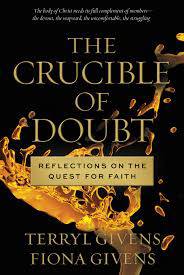 Book Review: “The Crucible of Doubt” by Terryl and Fiona Givens
Book Review: “The Crucible of Doubt” by Terryl and Fiona Givens
Deseret Book, 2014. Hardcover, Kindle and CD formats. 168 pages.
Years ago — twenty-two or so to be semi-exact — I reviewed Orson Scott Card’s collection of essays titled “A Storyteller in Zion.” It was his first deliberate piece for the LDS market in many years. I started it off saying Card made a good case for being the quintessential middle-of-the-road Mormon, annoying those both right and left of the LDS spectrum. I stand by that assertion. Now it’s time to add two more names to that list: Terryl and Fiona Givens.
The Givens are a husband-and-wife team of scholars. Terryl holds the James A. Bostwich Chair of English, is a professor of literature and religion at the University of Richmond, and has been writing about particularly thorny issues in the LDS faith for several years. Many people on the left have appreciated his scholarly approach to things and that he hasn’t shied away from uncomfortable things. And, of course, that makes people on the right side of the LDS church a little nervous. But these days, the left is a little uncomfortable with him, because, paraphrasing one criticism, he’s becoming an apologist for the LDS church. This particular critic was incensed with the title of their last book, “The God Who Weeps: How Mormonism Makes Sense of Life.” Keeping both sides on the edge is a good thing all around. Fiona first joined Terryl on “The God Who Weeps.” She’s a retired professor of modern languages with undergraduate degrees in French and German and a graduate degree in European history.
The breadth of their knowledge and experience make reading this book very rich and rewarding.
As with “The God Who Weeps,” this book is a relatively thin volume, only 145 pages minus chapter notes and index. But that doesn’t mean it’s not deep and thought-provoking.
One criticism about Mormonism in general is that Mormons ask no questions or have no doubts or curiosity. The Givens, however, remind us, that Joseph Smith’s first experience in the grove was based on asking a question and that the revelations in the Bible and Doctrine and Covenants came as answers to asking questions. So questions in and of themselves are not bad or to be avoided. The problems arise when you base your questions on faulty assumptions, not enough information, and incorrect perceptions.
They spend 11 chapters looking at the various things that can inspire doubt and questions and do their best to guide the reader, or doubter if you will, in directions that will answer their questions or at least help them to understand better as they continue searching.
From the outset, they help us to realize we understand much more than we think and our ways of learning are more than we comprehend. The Givens write, “We know more than we think. And we know in more ways than we sometimes realize because different ways of knowing abound,” even as they warn against relying entirely on science as our guide through life. “Science can tell us a great deal about the world … but it does not tell us why we should care about the nature of stars, why the staccato flash of insects delights us, or how the child should live.”
As with so many of his previous writings, Terryl Givens doesn’t shy from the tough stuff either. When it comes to the church itself, the Givens get both sides in their sights: “The Church was not designed like a Swiss Army Knife with a tool to meet every need, a program to serve every function. We often impose on the Church organization similar expectations, wanting it to fulfill purposes it was never intended to serve. … But religious forms are necessary — just not in the ways we might have conceived.”
The crucible of doubt burns away the dross and refines us. It forces us to look within, to adjust and grow or wither.
The Givens caution against the hero worship of prophets and apostles, citing President George Albert Smith: “Even to imply that members of the Church are not to do their own thinking is to grossly misrepresent the true ideal of the Church.” Again taking aim at both sides of the argument they also remind the reader: “A second reason for Gods choice of fallible human leaders is simply this: He has no other kind. … From God’s perspective, the problem is not the universality of human weakness: it is the universality of human trust in that weakness. He doesn’t warn against trusting in flawed flesh, but in human flesh. ‘Cursed is he that putteth his trust in the arm of flesh,’ writes Nephi. Any human flesh. That is the point. ‘I will trust in thee,’ pledges the insightful Nephi.”
As for Mormons having a monopoly on everything good and religious, the Givens show us a little-seen scripture in the Doctrine and Covenants section 49, verse 8, where the Lord tells Joseph Smith that the world is under sin, “except for those I have reserved unto myself, holy men that ye know not of.”
For those who feel they have been abandoned by God, or ignored or forgotten, they delve deeply into Church history to point out that Joseph Smith often experienced lengthy periods of time when no answers came from the Lord regarding many things. And these were many of the darkest days of the nascent church. So if you’re not getting answers, you’re in good company. Or we’re looking for answers in the wrong places or not listening correctly. There are times they point out when we’re looking for the neon flashing answer, and we ignore the quiet, subtle answer. Or there are other times when we are straining so hard to hear the “still small voice” that we don’t see the big answer. The Givens write: “We so strain to hear the voice in the whirlwind that we fail to see the light breaking in the east. We are waiting for messages even as our world has been miraculously reconstituted around us.”
To the nonbelievers, they openly warn that belief is risk, but one worth investigating and taking. It is a refining fire.
The Givens have mined the wisdom of both the world’s greatest minds and thinkers and dug deeply into LDS church history to present a book that is both comforting and provoking. Their use of language is exciting as it lays bare the frustrations people often feel in the face of religion and God as well as in its promise of hope to the honest seeker of truth. “The Crucible of Doubt” is a rich and revelatory experience for those readers who are willing to take the journey offered by the Givens.
Articles related to “Book Review: ‘The Crucible of Doubt’ by Terryl and Fiona Givens”





“The problems arise when you base your questions on faulty assumptions, not enough information, and incorrect perceptions.” I would think that you meant to write, “The problems arise when you base your answers on faulty assumptions, not enough information, and incorrect perceptions.”
No, Jason, my comment stands as is. The Givens’ premise is that doubt arise when people don’t have enough information, incomplete information and faulty assumptions. You can find this inside the dust jacket as well as in the book’s introduction–Paradigms and Premises: Starting off on the Wrong Foot.
Oh, I didn’t realize that you were quoting the authors. That wasn’t clear. Still what they said and what you said are a little different. Problems and doubt arising are not the same. Doubt can lead to truth, and that’s not a problem unless one is attempting to quash the truth.
Either way, a question based upon faulty assumptions, not enough information, and incorrect perceptions is still worth asking because it can still lead to the truth. “What’s wrong with my car? Why won’t it start?” “You car WILL start, you just didn’t have the clutch held down.” The person asking the question had made a faulty assumption (the car won’t start due to the car’s condition), didn’t have enough information (unaware that the clutch has to be depressed), and incorrect perceptions (the car is broken rather than being operated incorrectly).
Here, a question based upon the premises stated above still leads to the truth. So I’d argue that there’s no problem with basing a question on faulty assumptions, not enough information, and incorrect perceptions.
An actual problem does arise when those who have put themselves in the position of answering the questions base their responses upon faulty assumptions, not enough information, and incorrect perceptions, which is often the case with religions, which decide what they want the truth to be and then go about trying to find evidence to prove it. It’s also how corrupt scientists go about obtaining “evidence” for corporate taskmasters who would like to argue that something is safe or dangerous contrary to the truth. In short, basing the answers to questions on the criteria you stated is problematic in that it’s dishonest, regardless if it’s carried out by religion or bad science.
As you stated, Mormons have been widely noted, like ostriches with heads buried, to ask no questions. That’s because they are instructed to obey and respect authority and believe what they are told. Curiosity is discouraged. This is repugnant to a free and open society that understands that unfettered access to information and an uninhibited right to seek the truth are fundamental components to liberty.
Mormons, like the rest of the human race, should always ask questions regardless of what they are told. Questions should never be criticized, only answered. There are no wrong questions, only lots of wrong answers.
Mormons are far less instructed to have curiosity than you may think. Why to you read the book and see what the authors have to say about it all? Obviously, I haven’t explained it as clearly as I thought I had.
No, I’ve never had the impression that curiosity is encouraged to any extent. They appear to be instructed not to have curiosity but rather to respect authority and believe what they’re told. In that climate, I think it’s harmful to criticize questioning by finding fault in the question rather than answering it, because an environment wherein faith is emphasized over one’s right to seek the truth is ripe for abuse.